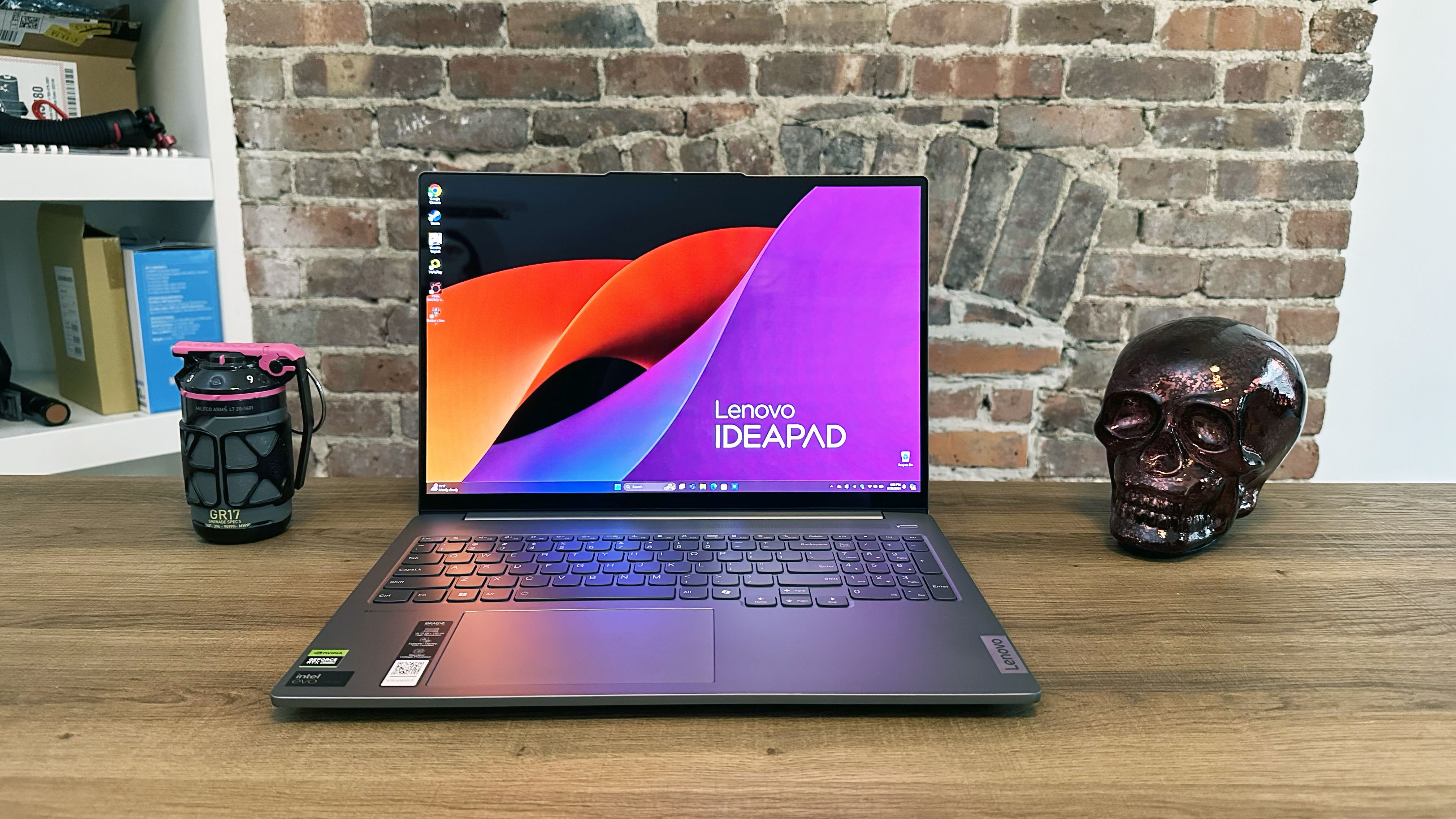
The Lenovo IdeaPad Pro 5i is a consumer laptop for people needing powerful performance, a quality OLED display, and discrete graphics without sacrificing too much battery life. And to that end, the IdeaPad Pro keeps its promises and has a low starting price to boot.
The IdeaPad Pro 5i offers the latest Intel Core Ultra processor with discrete Nvidia RTX graphics, an optional upgrade to the 16-inch 2K OLED display, and battery life that can easily last a full workday. However, it struggles with an uninspired design, tinny speakers, a grainy webcam, and a disappointing keyboard.
But does the IdeaPad Pro 5i deliver on enough of its promises to make it onto our best laptops list?
Lenovo IdeaPad Pro 5i 16: Specs
Lenovo IdeaPad Pro 5i 16 (Gen 9): Price and configurations
The base model of the IdeaPad Pro 5i gets you an Intel Core Ultra 5 125H processor, Nvidia GeForce RTX 3050 graphics, 16GB of DDR5 memory, 512GB of storage space, and a 16-inch WQXGA (2,560 x 1,600) IPS anti-glare display. That model comes with a full retail price of just $1,172.
For $1,499 you get an upgrade to the Intel Core Ultra 7 155H processor, 1TB of storage space, and the 16-inch 2K (2,048 x 1,280) OLED display. The fully built model we reviewed costs $1,699 and comes with an upgraded Intel Core Ultra 9 185H processor, Nvidia GeForce RTX 4050 graphics card, and 32GB of DDR5 memory. The fully kitted IdeaPad Pro 5i is currently only available through B&H.
Of course, you should never pay the full retail price for a Lenovo laptop, as a discount is almost always available on the Lenovo site. Most third-party retailers follow suit with the discounted pricing.
Lenovo IdeaPad Pro 5i 16 (Gen 9): Design
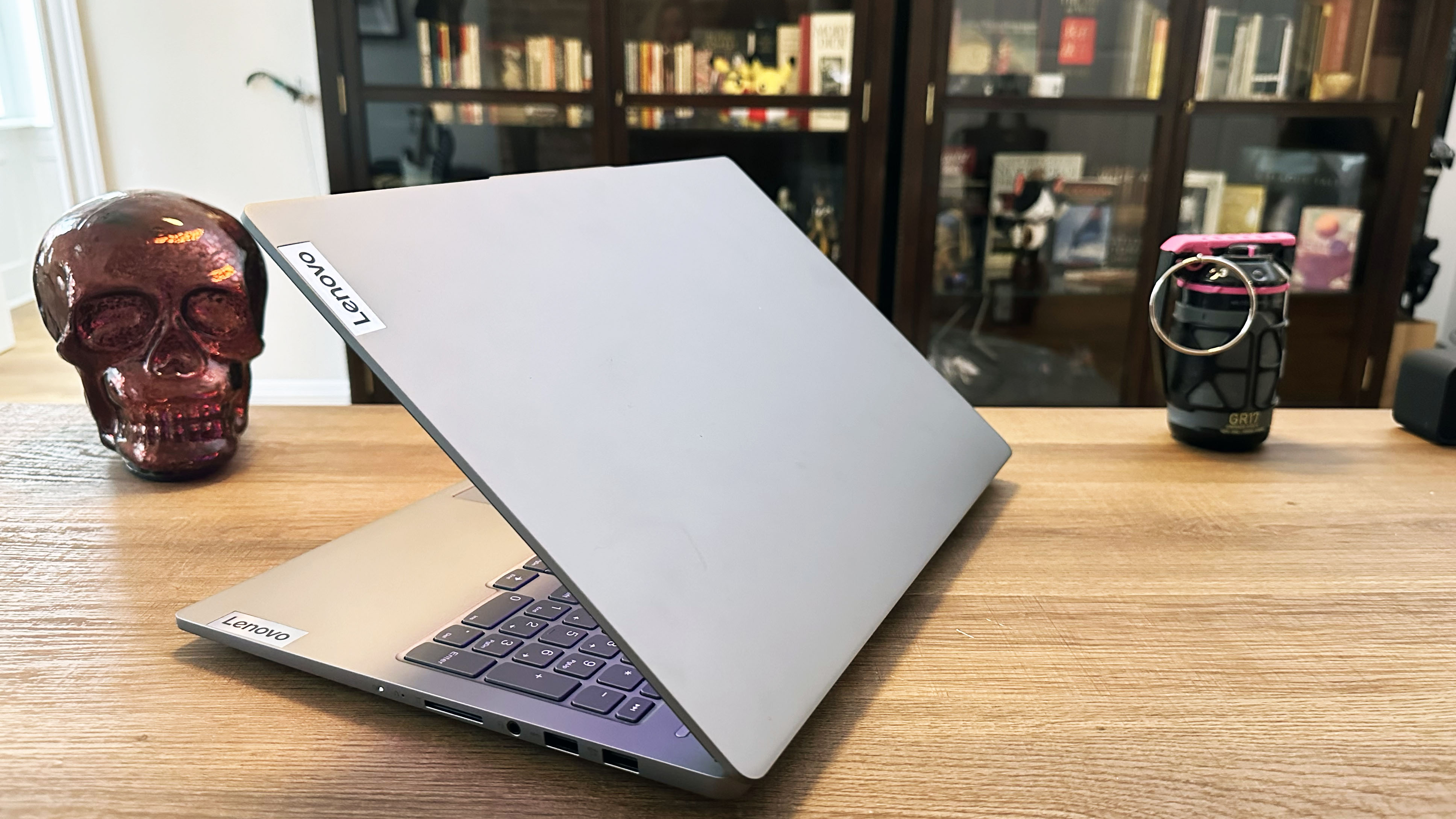
I’ve never been thrilled by the design of the IdeaPad lineup; like many of Lenovo’s designs, I just find the IdeaPads rather boring and uninspired. That said, one person’s boring and uninpired is another person’s understated minimalism. The IdeaPad Pro doesn’t strike that balance in a way I love, but it is a simple, unassuming silver aluminum chassis in Lenovo’s Artic Grey colorway. So it’s uncontroversial and can fit into various environments without being too attention-grabbing.
When it comes to lightweight portability, the IdeaPad Pro is remarkably light and thin for a laptop with a discrete GPU. Measuring 14.02 x 9.88 x 0.69 inches and weighing 4.38 pounds, the IdeaPad Pro isn’t a backbreaker of a laptop. It may be a little chunkier than other 16-inch laptops like the Samsung Galaxy Book 4Edge, MSI Prestige 16 AI Evo, or Asus Zenbook S16 but it is packing an Nvidia RTX 4050 GPU under the hood while most of our other mainstream 16-inch laptops are rocking integrated graphics.
The MSI Prestige 16 AI Evo is the lightest option, measuring 14.11 x 10.01 x 0.66 inches and weighing 3.3 pounds. Meanwhile, the Samsung Galaxy Book 4 Edge is the thinnest, measuring 13.9 x 9.8 x 0.4 inches and weighing 3.4 pounds. The Asus Zenbook S16 is solidly between those two, measuring 13.92 x 9.57 x 0.47-0.5 inches and weighing 3.31 pounds. So while the IdeaPad Pro is thicker and heavier than the competition, it doesn’t come without benefit.
The IdeaPad Pro 5i is portable enough to fit in any standard backpack or laptop bag. So you won’t have to worry about lugging a massive machine to work or class.
Lenovo IdeaPad Pro 5i 16 (Gen 9): Ports
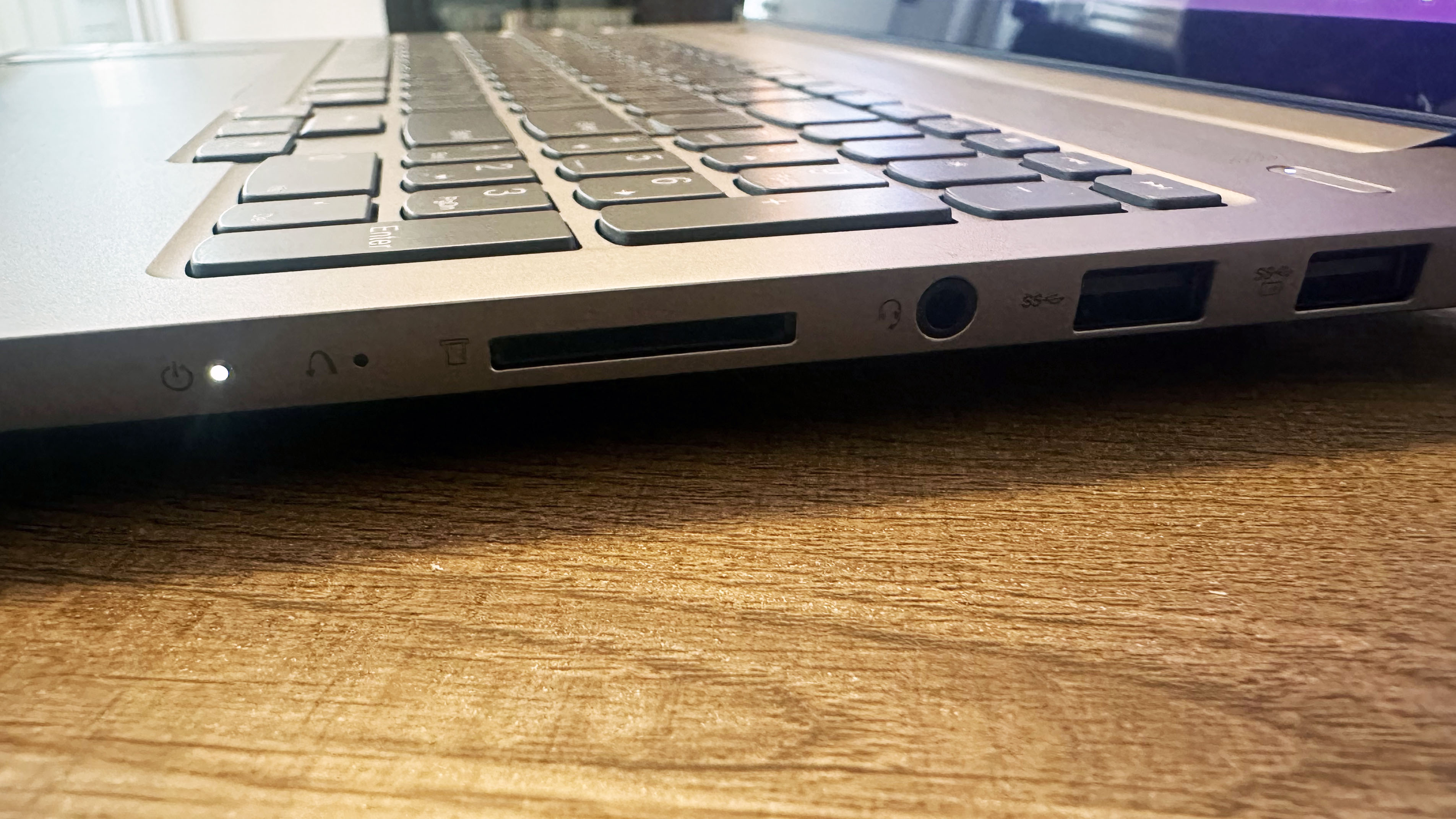
The IdeaPad Pro 5i features a ThunderBolt 4 port, one USB Type-C 3.2 Gen 1 port, two USB Type-A 3.2 Gen 1 ports, an HDMI 2.1 port, an SD card reader, a 3.5mm audio jack, and a proprietary Lenovo power-in port.
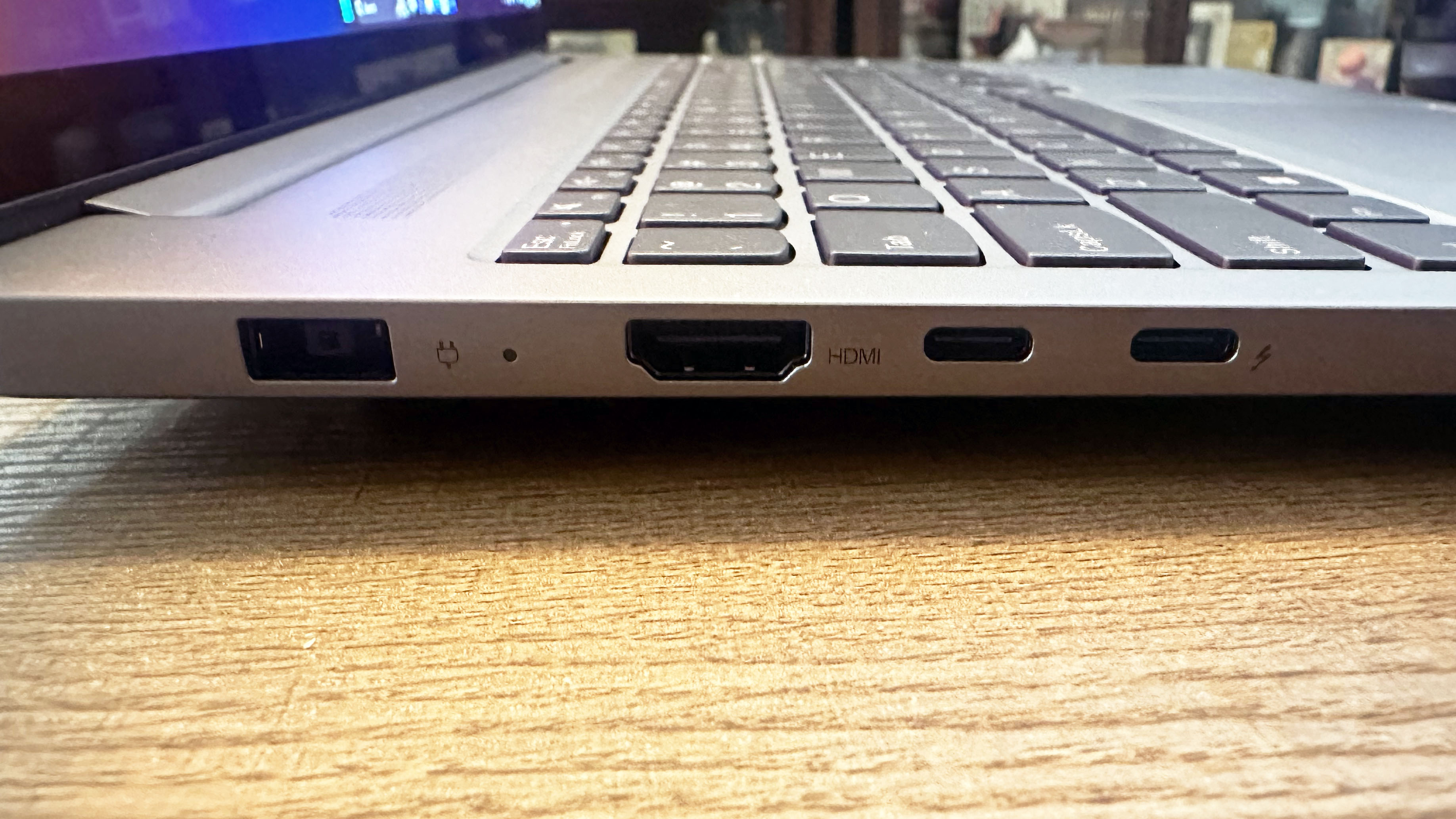
While there are a decent amount of ports on the IdeaPad Pro, if you want to work the laptop into a permanent desktop setup, investing in one of the best USB Type-C hubs or best laptop docking stations to kit out your space would be a good idea.
Lenovo IdeaPad Pro 5i 16: Security
The IdeaPad Pro 5i features a 1080p infrared webcam that can be used for secure Windows Hello sign-in. The webcam also features a physical shutter for extra privacy.
Lenovo IdeaPad Pro 5i 16 (Gen 9): Display

The 16-inch OLED display on our version of the IdeaPad Pro 5i is worth the upgrade. As nice as an IPS panel can get, the viewing experience of an OLED is just so much nicer, and the panel on the IdeaPad is no exception.

To put the OLED display to the test, I streamed the trailer for Warner Bros. upcoming animated feature The Lord of the Rings: The War of the Rohirrim. While the scenes from Peter Jackson’s live-action The Lord of the Rings trilogy starts the trailer with the same stunning austerity of New Zealand’s south island, the OLED panel on the IdeaPad Pro 5i shines with the animated scenes from the new The War of the Rohirrim film that follow. From the vibrant interiors of the castle of Rohan to the smoothly animated exterior fight scenes, the IdeaPad’s OLED display makes an already gorgeous trailer into a true feast for the eyes.
Our lab tested backed up my personal experiences with the IdeaPad, as our colorimeter measured the IdeaPad Pro 5i’s display panel as covering an impressive 129.7% of the DCI-P3 color gamut with a Delta-E accuracy of 0.24. This was more vibrant than the other 16-inch mainstream laptops, with only the MSI Prestige 16 AI Evo rating as more vibrant and accurate, covering 137.9% of the DCI-P3 color gamut with an accuracy of 0.17. The Asus Zenbook S16 (79.7% with a Delta-E of 0.23) and Samsung Galaxy Book 4 Edge (81.8% with a Delta-E of 0.19) fail to cover 100 percent of the DCI-P3 color space.
As for brightness, the glossy OLED panel on the IdeaPad Pro 5i wasn’t the brightest 16-inch display we’ve ever seen, but the anti-glare coating did a solid job competing with bright overhead light glare regardless. The IdeaPad Pro 5i was measured in our labs with an average peak brightness of 366 nits, similar to the other 16-inch Windows laptops. The Galaxy Book 4 Edge was the brightest at 387 nits, while the Prestige 16 AI Evo (368 nits) and Zenbook S16 (357 nits) were much closer in brightness to the IdeaPad Pro.
Lenovo IdeaPad Pro 5i 16 (Gen 9): Keyboard and touchpad
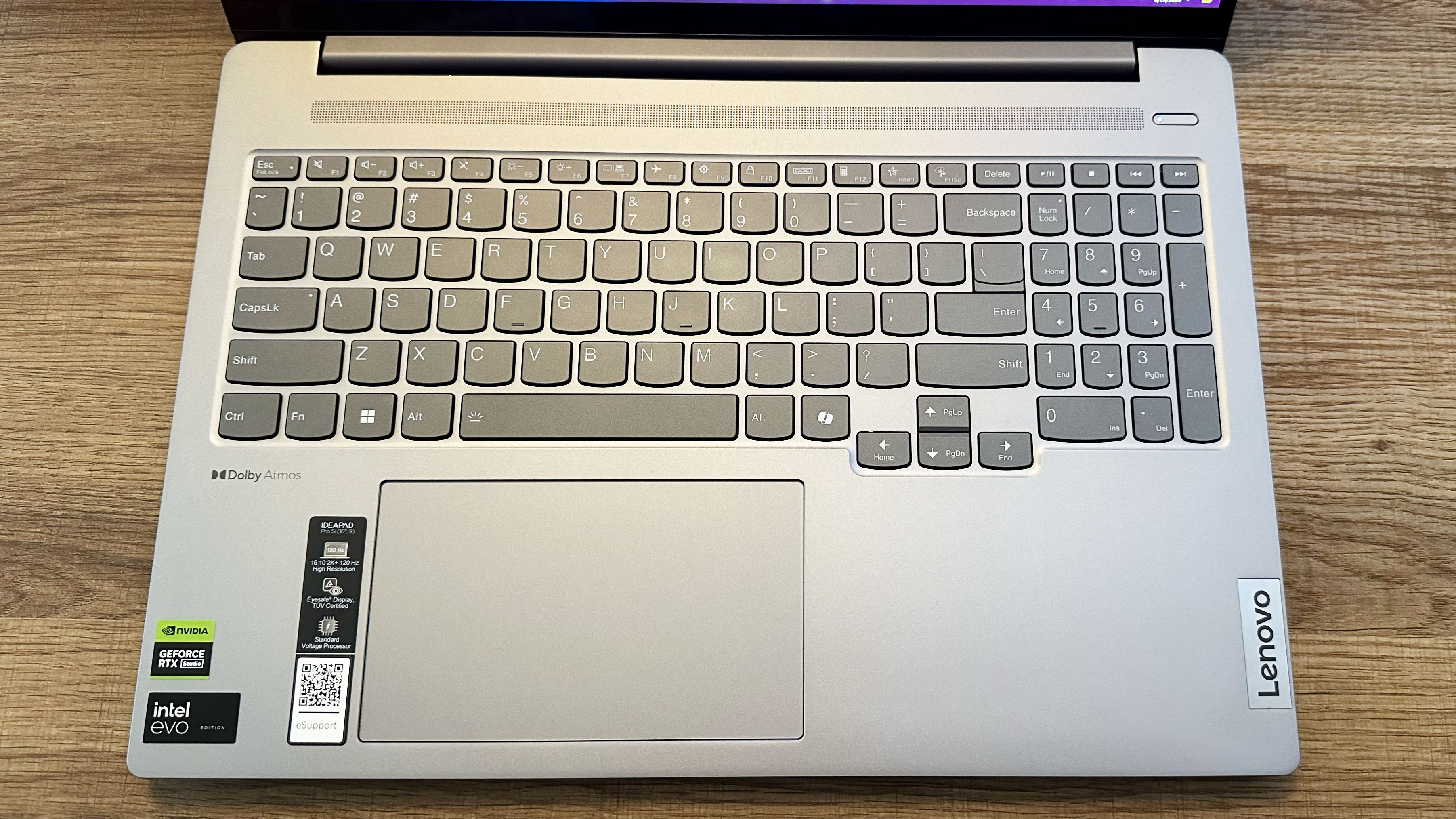
It may not be the first thing you think about when evaluating a laptop, but a bad keyboard can make or break the user experience. The IdeaPad Pro’s keyboard has a soft, high-actuation for each key, which keeps your fingers from bottoming out when typing, but it also left me second-guessing whether I’d hit the key.
While that wasn’t too disruptive during most of my time with the IdeaPad Pro 5i, I took a pretty solid hit on my words per minute (WPM) average when it came to typing speed. On my standard Apple MacBook Pro 14 M1 Pro keyboard, I keep a rather stable 88 WPM average on the 10FastFingers advanced typing test, while I managed to hit only 82 WPM on the IdeaPad as I was constantly re-reading my typing input to ensure I’d hit the keys.
The large 5.3 x 3.1-inch glass touchpad provided a smooth scrolling experience with the standard multi-touch gesture controls and decent palm rejection.
Lenovo IdeaPad Pro 5i 16 (Gen 9): Audio

Lenovo brands the IdeaPad Pro as a high-end consumer laptop offering the best of performance, battery life, and graphics all in a convenient package. So, for a multi-purpose consumer laptop, the audio experience is more important than on a business laptop. Thankfully, the IdeaPad Pro 5i has a Dolby Atmos-tuned four-speaker array of two woofers and two tweeters that provide a decent bit of power.
On more clean tracks like summer sensation Chappel Roan’s “Pink Pony Club” the IdeaPad sounds clear with defined highs, mids, and lows. However, the speakers struggle a bit with a tinny overlay on more distorted tracks like Arizona metal band Samsara’s track “Relics.”
However, it is enough to handle video calls or a casual YouTube binge. But, if you want immersive surround sound, you’re better served with one of the best computer speakers.
Lenovo IdeaPad Pro 5i 16: Performance
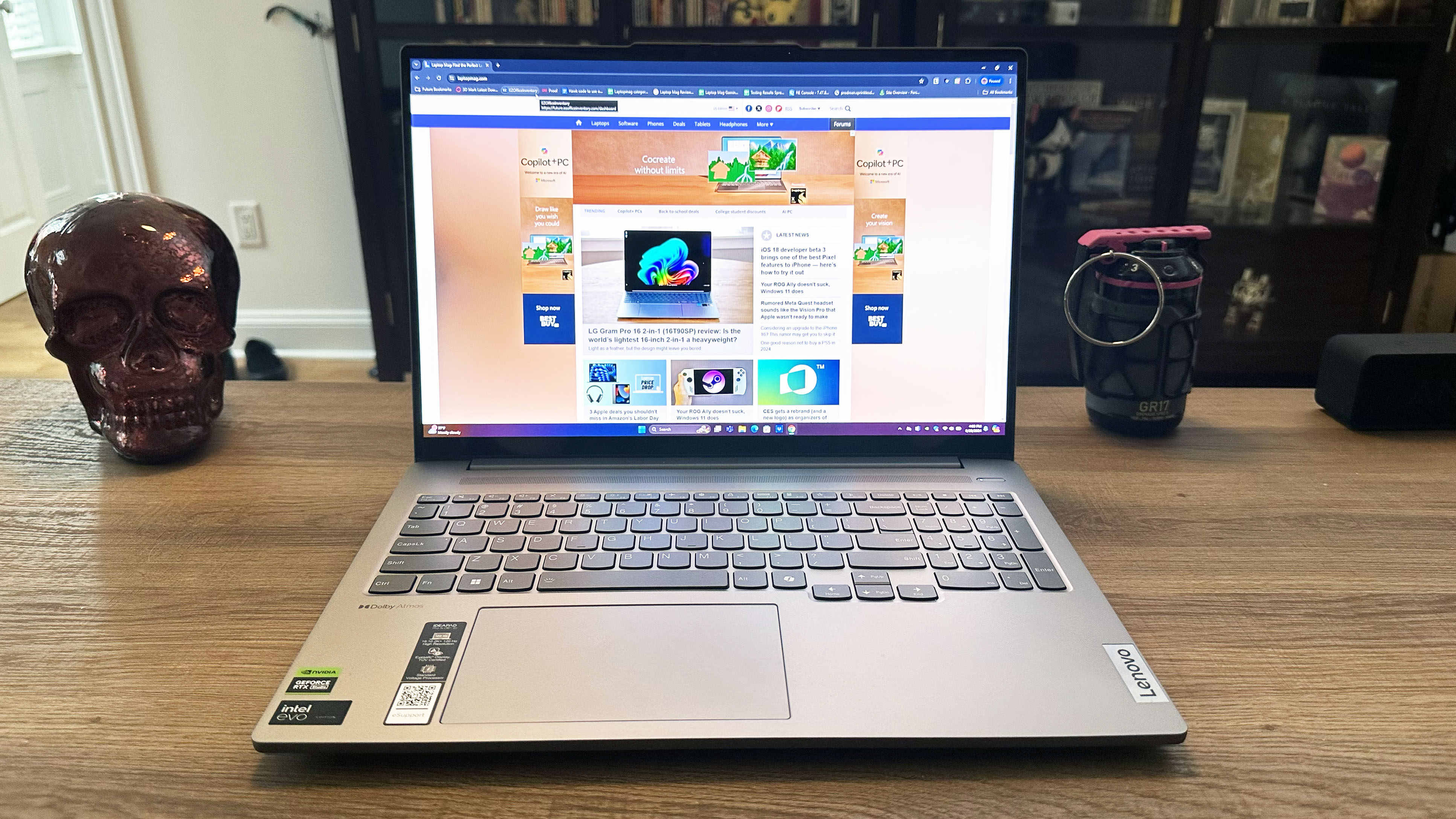
With an Intel Core Ultra 9 185H processor and 32GB of DDR5 memory, the IdeaPad Pro 5i should have more computing power than most people need. Indeed, the laptop did keep up with my usual workload of 20+ “research” Chrome tabs, Spotify, and occasional Photoshop work. However, it occasionally struggled with scrolling through YouTube listings, which could have been thanks to the Windows Update loading in the background. Still, I found the IdeaPad a generally dependable machine with minimal issues opening applications, browsing the web, or streaming audio and video.
Our lab benchmarks indicated a similar performance experience, with the IdeaPad Pro 5i scoring a Geekbench 6 single-core average of 2,553 and a multicore average of 14,123. The MSI Prestige 16 AI Evo and its Intel Core Ultra 7 155H processor put up a good fight with a single-core average of 2,434 and a multicore average of 13,310, but the Ultra 7 did lose out on a bit of single-core and multicore performance compared to the upscaled Ultra 9 processor. The AMD Ryzen AI 9 HX370 powered Asus Zenbook S16 had a better single-core performance with an average of 2,765 while it struggled a bit behind both Intel processors on multicore performance with an average of 13,282. Only the topline Qualcomm Snapdragon X Elite XIE-84-100 processor in the Samsung Galaxy Book 4 Edge had better performance across both Geekbench 6 tests than the IdeaPad, with a single-core average of 2,935 and a multicore average of 15,818.
On our handbrake video encoding test which tasks a laptop with transcoding the 4K version of “Tears of Steel” into a 1080p 30 FPS format, the IdeaPad Pro 5i held the top spot with a respectable 3 minutes and 47 seconds average completion time. The Galaxy Book 4 Edge was the next fastest, with an average time of 4:59 to complete the encoding. The Asus Zenbook S16 (5:08) and MSI Prestige 16 (5:27) could not complete the encoding in under 5 minutes.
Finally, on our file transfer test, which involves copying a 25GB multimedia folder and timing how long the laptop takes to complete the transfer, the IdeaPad Pro took just 24 seconds to complete the task for a transfer rate of 1,113 MBps. The MSI Prestige 16 was the quickest at this test, taking just 19.2 seconds for a transfer rate of 1,400 MBps. The Galaxy Book 4 Edge was a bit behind the IdeaPad, taking 24.59 seconds to complete the test, for a transfer rate of 1,092 MBps.The Zenbook S16 was the slowest, taking 29.55 seconds for a transfer rate of 908 MBps.
Lenovo IdeaPad Pro 5i 16 (Gen 9): Graphics and gaming
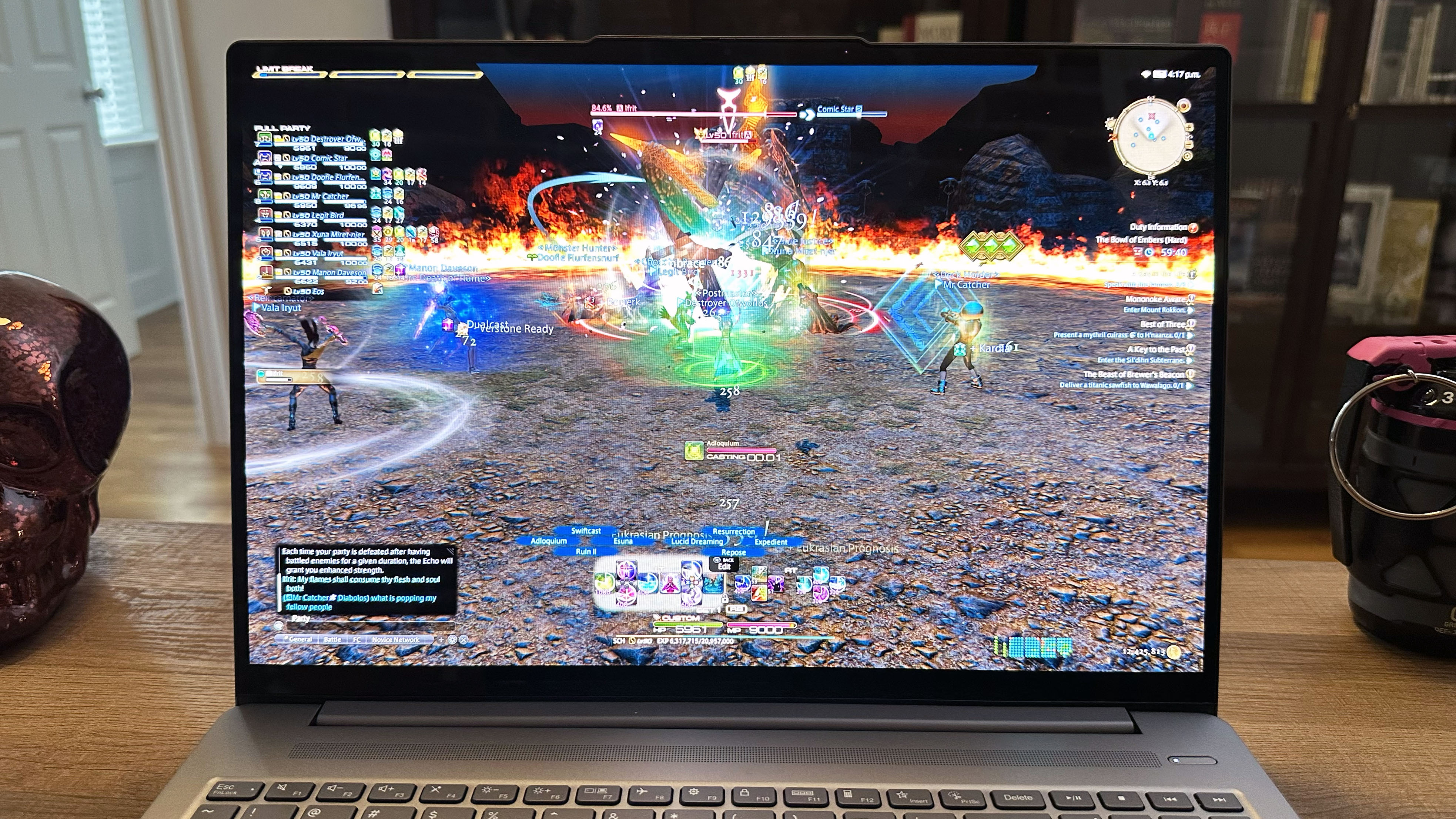
Generally speaking, gaming isn’t why you’re buying a multi-purpose mainstream laptop like the IdeaPad Pro. Of course, I tend to try gaming on all laptops regardless because I prefer to wind down at the end of the day by handling some daily or weekly tasks in my live service games of choice. The IdeaPad Pro does have a discrete Nvidia RTX 4050 GPU, but the IdeaPad is designed more for photo and video editing or STEM homework, but it is a gaming rated GPU, so I figured putting in some game time would be well worth it.
As I’d discovered while testing the recent graphics overhaul in Final Fantasy XIV with the new Dawntrail expansion, the RTX 4050 on the IdeaPad Pro struggled with running new content in the MMO. Even in uncrowded zones in the new game areas on Laptop (Standard) graphics settings and 1080p resolution, the IdeaPad struggled to maintain a stable 60 FPS framerate, as it rubberbanded quite a bit between highs of over 100 FPS and lows of 40 FPS. I had quite a bit more luck getting a consistent 30+ FPS with Genshin Impact, but I’ve also played Genshin on smartphones so that’s not the most stressful game test possible.
When compared to other 16-inch consumer laptops, the IdeaPad Pro certainly has the best graphics. But then, that’s comparing a discrete GPU to integrated Intel, AMD, and Qualcomm graphics chipsets which is more than a bit unfair. So naturally, our lab tests see a huge difference in graphics performance between the IdeaPad and its competitors like the Prestige 16 or Zenbook S16. On the 3DMark Fire Strike Direct X 11 benchmark, the IdeaPad Pro averaged a score of 20,956. The MSI Prestige 16 AI Evo with its integrated Intel Arc graphics put up a decent fight but still only scraped by with an average score of 8,192. The Asus Zenbook S16 with its integrated Radeon 890M graphics (7,468) and Samsung Galaxy Bok4 Edge with its integrated Qualcomm Adreno graphics (6,003) both failed to even keep up with the MSI.
We also tested all four laptops on the Sid Meier’s Civilization VI: Gathering Storm benchmark on medium settings, with the IdeaPad once again making a great case for why integrated GPUs just don’t keep up when it comes to gaming. The IdeaPad Pro held an 122 FPS average of the Civ VI benchmark at 1080p, while the MSI Prestige 16 held out with a respectable, though much lesser, 66 FPS average. The Zenbook S16 (63 FPS) and Galaxy Book4 (24 FPS) both lagged behind in comparison.
Lenovo IdeaPad Pro 5i 16 (Gen 9): Battery life
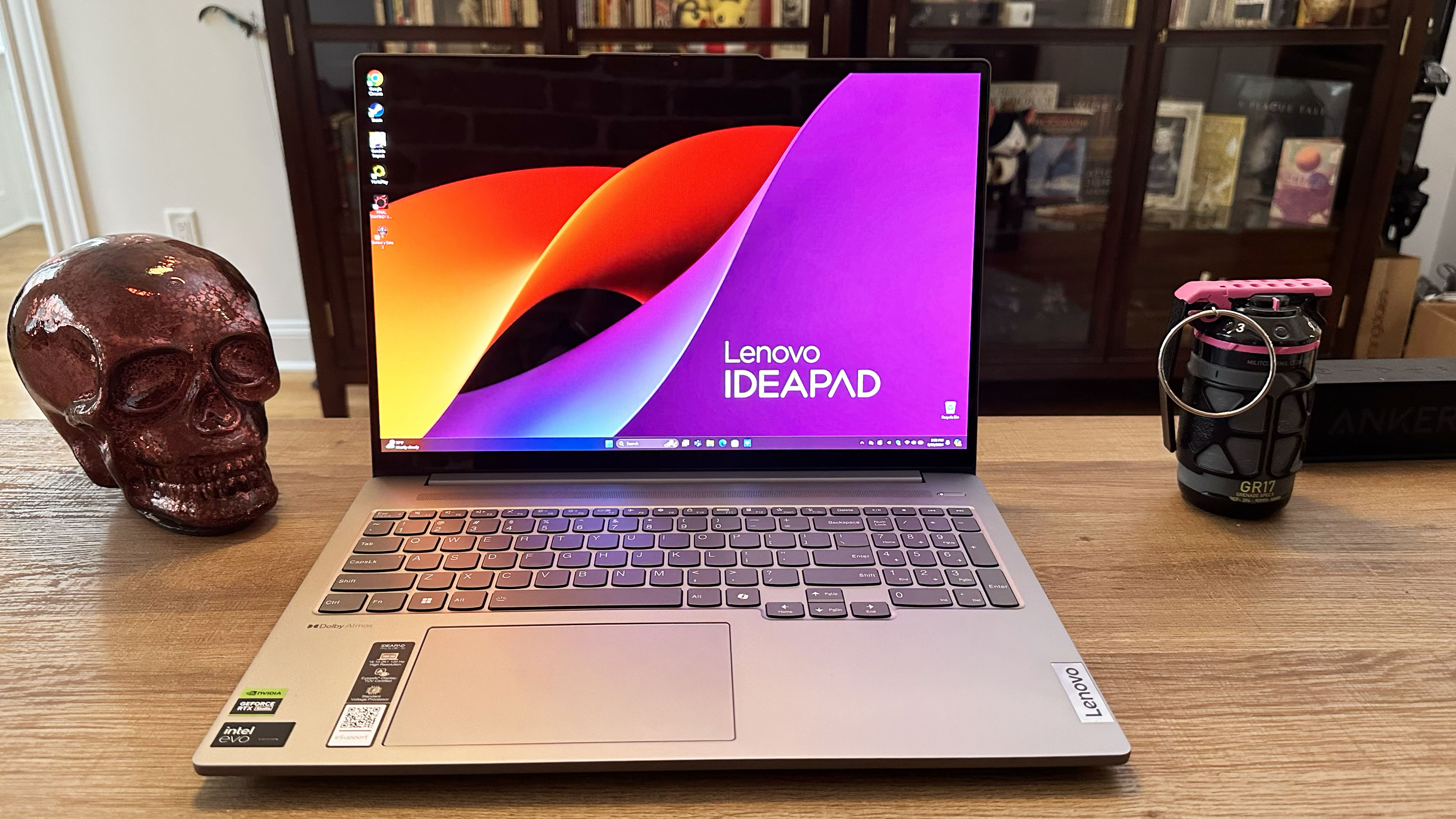
When it comes time for me to recommend laptops to friends or to readers in our buying guides, battery life is one of the most important features I look at. Laptops essentially live and die by their battery life, as the ability to browse the web or stream videos on the go is the biggest reason to opt for a laptop over a desktop. The IdeaPad Pro 5i did a decent job of keeping up with an 8-hour workday and kept up with my 20+ research Chrome tabs and light Photoshop work. Granted, it did need to rush to a wall outlet at the end of my shift, but that’s not too bad for a 16-inch OLED laptop.
The IdeaPad Pro 5i survived an impressive 10 hours and 31 minutes on the Laptop Mag battery test, which sets a laptop to 150 nits of brightness and sets it surfing the web across a variety of static, dynamic, and video webpages. This wasn’t the longest-lasting laptop we’ve seen, but it has impressive battery life for a Windows laptop with an OLED display. The MSI Prestige 16 AI Evo with its 16-inch OLED panel had the best battery life of our comparison laptops, lasting 13:04 on our battery test. The Asus Zenbook S16 also features an OLED display and outlasted the IdeaPad with a battery life of 11:35. However, the Samsung Galaxy Book 4 Edge 16-inch OLED model struggled just behind the IdeaPad with a battery life of 9:56.
So while the battery life of the IdeaPad Pro 5i isn’t going to be hitting our list of laptops with the best battery life any time soon, it didn’t do too badly.
Lenovo IdeaPad Pro 5i 16 (Gen 9): Webcam

Like most FHD laptop webcams, especially those of the infrared variety, the IdeaPad Pro 5i’s webcam produces a rather grainy feed with a bit of color bleed. While it’s fine for the occasional video call, if you need a professional-quality webcam for presentations and video calls, I recommend using one of our best webcams instead.
Lenovo IdeaPad Pro 5i 16 (Gen 9): Heat
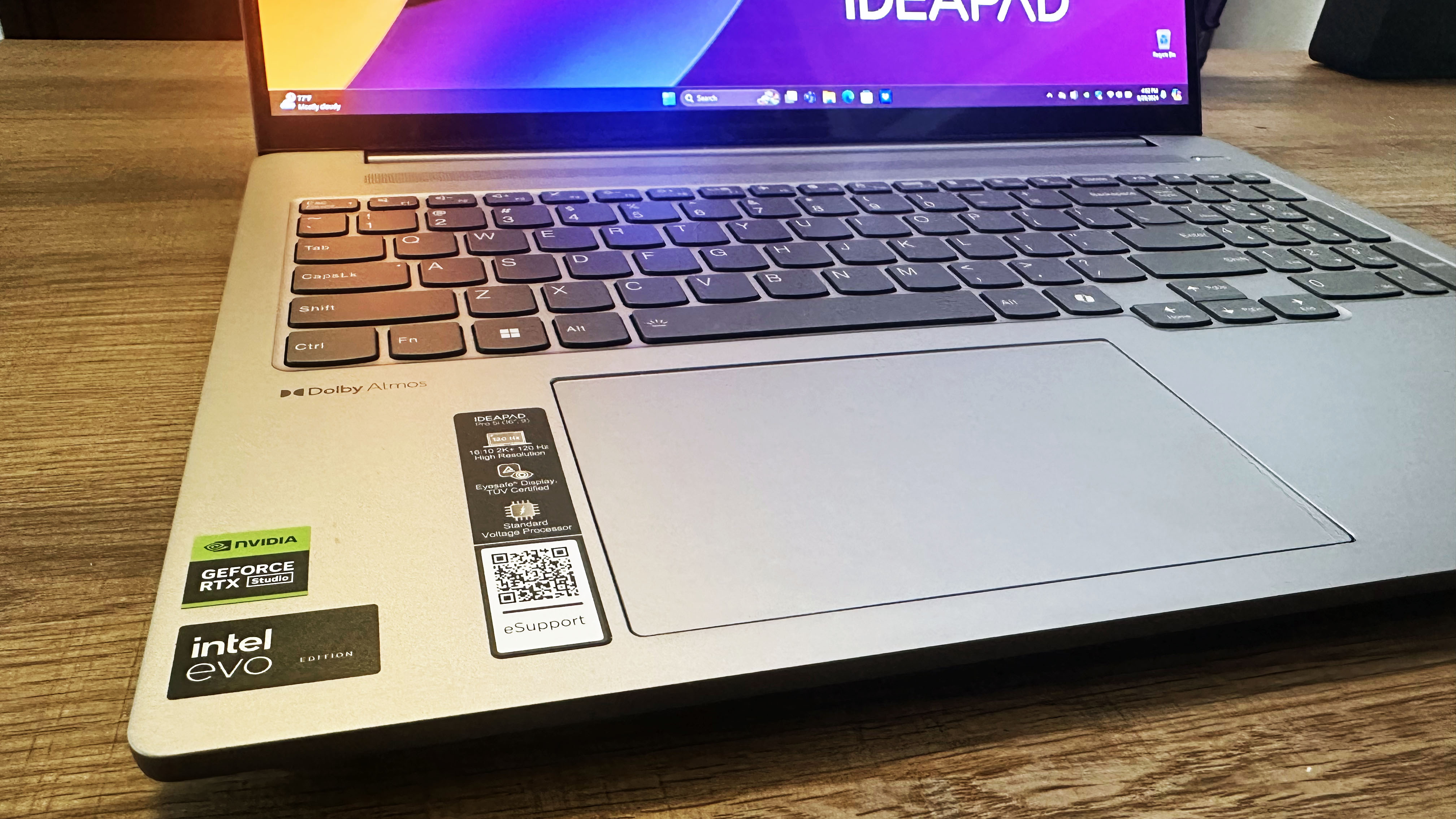
When operating under more normal circumstances with some web browsing, video streaming, and light Photoshop work, the IdeaPad Pro 5i didn’t throw off much heat. I only noticed that the laptop got hot after a sustained gaming session, which makes sense. The RTX 4050 GPU can throw off a decent bit of heat, and the IdeaPad isn’t a gaming laptop so it makes sense the laptop’s fans can struggle when under sustained stress.
But for even more stressful streaming sessions, the IdeaPad Pro 5i doesn’t get uncomfortably hot. On the Laptop Mag heat test, which involves streaming a 4K YouTube video for at least 15 minutes before measuring the heat, the IdeaPad Pro 5i hit a high temperature of 93 degrees Fahrenheit, which peaked near the vents on the bottom of the laptop.
93 degrees is below the Laptop Mag comfort threshold of 95 degrees, but it will still feel rather toasty so you may want to avoid putting the IdeaPad directly in your lap while streaming movies or playing games.
Lenovo IdeaPad Pro 5i 16 (Gen 9): Software and warranty
The IdeaPad Pro 5 has a 1-year warranty with courier or carry-in service, with an optional 2-year courier or carry-in service upgrade that will cover everything but the battery. If you want to see how Lenovo’s customer service performed in our annual ranking, check out our Tech Support Showdown list.
The laptop comes with Windows 11 Pro pre-installed, so you get the standard Microsoft applications like Office 365 and OneDrive, plus the Lenovo Vantage software suite.
Bottom line

Even with our high-end specs, the IdeaPad Pro 5i keeps its promised relatively long-lasting battery life despite the increased power consumption of a discrete Nvidia RTX 4050 GPU and 16-inch 2K OLED display panel. Which should make it one of my favorite laptops. I love a good combination of power and efficiency, especially if it meets expectations.
And yet, it’s the small details that trip up the IdeaPad Pro. From a grainy IR webcam, tinny audio, mushy keyboard, and boring design, there’s much to find lacking with this Lenovo laptop. While none of these faults are enough to tank the IdeaPad completely, they equate to a disappointing package. If even one of these issues were fixed, the IdeaPad Pro could be an absolute bargain of a laptop, but with the overall experience being subpar across several features, I just can’t see anyone opting for the IdeaPad Pro when Lenovo offers so many other quality laptops.







